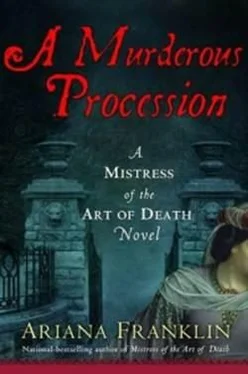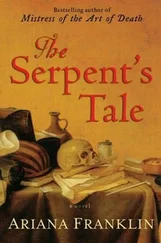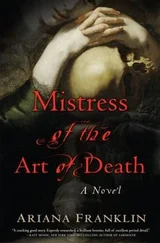
Ariana Franklin
A Murderous Procession aka The Assassin's Prayer
The fourth book in the Mistress of the Art of Death series, 2010
To my brother, Roger, and my sister-in-law, Ann
BETWEEN THE PARISHES OF Shepfold and Martlake in Somerset existed an area of no-man’s-land and a lot of ill feeling.
Just as the nearby towns of Glastonbury and Wells were constantly at odds, so did these two small villages dispute over whose pigs had a right to graze on the beech mast of the intervening forest, which stream was diverted to irrigate whose crops, whose goats trespassed over the boundary and ate whose laundry, etc., etc.
Today, Lammas Saturday, after a fine summer that had enabled the harvest to be brought in exceptionally early, the two sets of villagers, everybody who could walk and even some who couldn’t, faced each other across this strip of ground on which had been erected a dais to accommodate Lady Emma of Wolvercote (her manor was in Shepfold), her husband, and Sir Richard de Mayne (his manor was in Martlake), the two parish priests, an Arab doctor, his attendant, an elderly woman, and a ball the size of a good pumpkin consisting of tough leather stitched over a globe of withies stuffed with sawdust.
Father Ignatius (Shepfold) made the last of many appeals to prevent what was going to happen.
“My lady, Sir Richard, it is not too late to avert this evil and send all home… the sheriff has specifically banned…”
His protest fell on stony ground. Staring straight ahead, Sir Richard said: “If Shepfold is prepared to be humiliated yet again, who am I to disappoint it.”
Lady Emma, also refusing to turn her head, breathed heavily through her pretty nose. “This year it will be Martlake who is humiliated.” Master Roetger, the tall German leaning on a crutch beside her, gave her an approving and husbandly pat on the back.
Father Ignatius sighed. He was an educated and civilized man. Tomorrow, Sunday, he thought, these people will dress in their best to bring sheaves and fruit to church and give thanks to God for His infinite bounty as was right and proper. But always, by some hideous tradition peculiar only to them, on the day before Harvest Festival they revert to paganism and turn the eve of a Christian festival into something resembling the excesses of a Lupercalia. A madness.
Adelia Aguilar sighed with him and mentally ran through the medical equipment she’d brought with her-bandages, ointments, needles, sutures, splints.
It would be nice to think they weren’t going to be needed, but hope was outweighed by experience.
She looked up at the tall Arab eunuch standing beside her. He shrugged, helplessly. Sometimes England baffled them.
They’d traveled a long way together. Both of them born in Sicily, that melting pot of races; she, an abandoned baby, probably Greek, rescued and brought up by a Jewish doctor and his wife; he, later taken into the same, good household to be her attendant, once a lost boy with a beautiful voice whom the Latin Church had castrated so that he might retain it.
Circumstances-well, that damned King Henry II of England really-had plucked the two of them away from Sicily and dropped them down in his realm. And now, seven extraordinary years later, here they both were, on a bare piece of land in Somerset with two villages out to maim each other in what they called a game.
“I just don’t understand the English,” she said.
Gyltha, standing on the other side of her said, “Somerset folk ain’t proper English, bor.” Gyltha was a Cambridgeshire woman.
“Hmm.”
For God’s sake, she was a trained doctor, a specialist in autopsy, a medica of the Salerno School of Medicine in Sicily-probably the only foundation in Christendom to take women as students- and this is what I’ve come down to.
It wasn’t even that she could officially practice her craft. In England? Where the Church regarded a woman with medical knowledge as a witch?
Ostensibly Mansur had to be the one attending the wounded while she must seem to be carrying out his orders-a thin pretense but one that saved her from ecclesiastical punishment; also one to which, trusting them both, the two villages paid affectionate lip service.
The crowd was becoming restive. “For love of Mary, get on with it,” somebody called out, “afore us bloody melts.”
It was getting hot, early morning though it was. The sun that had ripened wheat and barley so beautifully was now slanting on yellow-white stubble in which rooks pecked up such corn as the gleaners had left them, brightening the forest beeches where some leaves were already showing autumn colors. On the balk strips, bees and butterflies were making free among trefoils and cornflowers.
Father Ignatius gave in and turned to his fellow priest, Father John. “To you the honor this year, sir, if honor it be.”
Father John, a Martlake man and therefore a lout, picked up the ball, raised it above his head, shouted: “God defend the right,” and threw it.
“That wasn’t straight,” Father Ignatius yelled. “You favored Martlake.”
“Bloody didn’t ”
“Bloody did.”
Nobody paid attention to the scuffling priests. The game had begun. Like great opposing waves, and with much the same noise, the two sides crashed together, their women and offspring skittering around the edges, screaming them on.
A Martlake boy emerged from the scrum, the ball at his twinkling feet, and began running with it in the direction of the Shepfold parish boundary, a mob of howling Shepfoldians at his back. Lady Emma, Sir Richard, and Master Roetger followed more sedately, while Adelia, Gyltha, and Mansur, carrying their medicaments, accompanied by Adelia’s six-year-old daughter and Emma’s four-year-old son, Lord Wolvercote, brought up the rear.
They paused at a safe distance to watch the scrimmage as the Martlake lad was brought down.
“There goes his nose,” Mansur remarked. “Is it not against the rules to kick in the face?”
“Better get the swabs out,” Gyltha said.
Adelia delved into her doctor’s bag. “What rules?” There were supposed to be some; no swearing, no spitting, no picking the ball up and carrying it, no gouging, no biting, no fisticuffs, no women nor children nor dogs to partake, but Adelia hadn’t seen any of them observed yet.
Gyltha was lecturing Adelia’s daughter. “You listen to me, dumpling, you get into a fight this time, an’ I’ll tan your little backside.”
“That’s right, Allie,” Adelia said. “No brawling. You and Pippy are not to take part, do you understand me?”
“Yes, Mama. Yes, Gyltha.”
By the time she’d dealt with the Martlake broken nose, children, ball, and contestants had disappeared. Distant howls were suggesting that the match was now in the forest. On its edge, Adelia’s old friends, Will and Alf, were lounging against a tree, waiting for her to come up.
“Go home,” she told them-they were Glastonbury men. “Don’t get involved, I won’t have enough bandages.”
“Just come to watch, like,” Will told her.
“Observers, we are,” Alf said.
She looked at them with suspicion; they’d been hanging around her a lot lately. But there was no time to inquire; screams from amongst the trees suggested that there were wounded. They followed her in.
A broken leg, two twisted ankles, a dislocated shoulder, and five scalp wounds later, the supply of injuries temporarily dried up. Mansur hoisted the protesting broken leg over his shoulder and set off to take it home to its mother. Gyltha was mopping up Allie. The noise had dwindled to isolated shouts. People were beating the undergrowth.
Читать дальше













